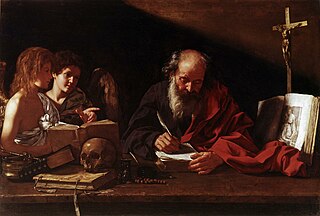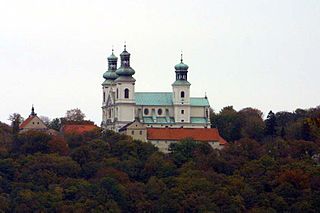
Anthony the Great was a Christian monk from Egypt, revered since his death as a saint. He is distinguished from other saints named Anthony, such as Anthony of Padua, by various epithets: Anthony of Egypt, Anthony the Abbot, Anthony of the Desert, Anthony the Anchorite, Anthony the Hermit, and Anthony of Thebes. For his importance among the Desert Fathers and to all later Christian monasticism, he is also known as the Father of All Monks. His feast day is celebrated on 17 January among the Eastern Orthodox and Catholic churches and on Tobi 22 in the Coptic calendar.
Monasticism, also called monachism or monkhood, is a religious way of life in which one renounces worldly pursuits to devote oneself fully to spiritual activities. Monastic life plays an important role in many Christian churches, especially in the Catholic, Orthodox and Anglican traditions as well as in other faiths such as Buddhism, Hinduism, and Jainism. In other religions, monasticism is generally criticized and not practiced, as in Islam and Zoroastrianism, or plays a marginal role, as in modern Judaism.

Pachomius, also known as Saint Pachomius the Great, is generally recognized as the founder of Christian cenobitic monasticism. Coptic churches celebrate his feast day on 9 May, and Eastern Orthodox and Catholic churches mark his feast on 15 May or 28 May. In Lutheranism, he is remembered as a renewer of the church, along with his contemporary, Anthony of Egypt on 17 January.

The Order of the Brothers of the Blessed Virgin Mary of Mount Carmel, known as the Carmelites or sometimes by synecdoche known simply as Carmel, is a mendicant order in the Catholic Church for both men and women. Historical records about its origin remain uncertain; it was probably founded in the 12th century on Mount Carmel in what is now Israel.
A monastery is a building or complex of buildings comprising the domestic quarters and workplaces of monastics, monks or nuns, whether living in communities or alone (hermits). A monastery generally includes a place reserved for prayer which may be a chapel, church, or temple, and may also serve as an oratory, or in the case of communities anything from a single building housing only one senior and two or three junior monks or nuns, to vast complexes and estates housing tens or hundreds. A monastery complex typically comprises a number of buildings which include a church, dormitory, cloister, refectory, library, balneary and infirmary and outlying granges. Depending on the location, the monastic order and the occupation of its inhabitants, the complex may also include a wide range of buildings that facilitate self-sufficiency and service to the community. These may include a hospice, a school, and a range of agricultural and manufacturing buildings such as a barn, a forge, or a brewery.

A hermit, also known as an eremite or solitary, is a person who lives in seclusion. Eremitism plays a role in a variety of religions.

The Camaldolese Hermits of Mount Corona, commonly called Camaldolese, is a monastic order of Pontifical Right for men founded by Saint Romuald. Its name is derived from the Holy Hermitage of Camaldoli, high in the mountains of central Italy, near the city of Arezzo. Its members add the nominal letters E.C.M.C. after their names to indicate their membership in the congregation. Apart from the Roman Catholic monasteries, in recent times ecumenical Christian hermitages with a Camaldolese spirituality have arisen as well.

Christian monasticism is a religious way of life of Christians who live ascetic and typically cloistered lives that are dedicated to Christian worship. It began to develop early in the history of the Christian Church, modeled upon scriptural examples and ideals, including those in the Old Testament. It has come to be regulated by religious rules and, in modern times, the Canon law of the respective Christian denominations that have forms of monastic living. Those living the monastic life are known by the generic terms monks (men) and nuns (women). The word monk originated from the Greek μοναχός, itself from μόνος meaning 'alone'.

Cenobiticmonasticism is a monastic tradition that stresses community life. Often in the West the community belongs to a religious order, and the life of the cenobitic monk is regulated by a religious rule, a collection of precepts. The older style of monasticism, to live as a hermit, is called eremitic. A third form of monasticism, found primarily in Eastern Christianity, is the skete.

The Hieronymites or Jeronimites, also formally known as the Order of Saint Jerome, is a Catholic cloistered religious order and a common name for several congregations of hermit monks living according to the Rule of Saint Augustine, though the role principle of their lives is that of the 5th-century hermit and biblical scholar Jerome.

The Desert Fathers were early Christian hermits and ascetics, who lived primarily in the Scetes desert of the Roman province of Egypt, beginning around the third century AD. The Apophthegmata Patrum is a collection of the wisdom of some of the early desert monks and nuns, in print as Sayings of the Desert Fathers. The first Desert Father was Paul of Thebes, and the most well known was Anthony the Great, who moved to the desert in AD 270–271 and became known as both the father and founder of desert monasticism. By the time Anthony had died in AD 356, thousands of monks and nuns had been drawn to living in the desert following Anthony's example, leading his biographer, Athanasius of Alexandria, to write that "the desert had become a city." The Desert Fathers had a major influence on the development of Christianity.

Consecrated life is a state of life in the Catholic Church lived by those faithful who are called to follow Jesus Christ in a more exacting way. It includes those in institutes of consecrated life, societies of apostolic life, as well as those living as hermits or consecrated virgins.

The Discalced Carmelites, known officially as the Order of the Discalced Brothers of the Blessed Virgin Mary of Mount Carmel or the Order of Discalced Carmelites, is a Catholic mendicant order with roots in the eremitic tradition of the Desert Fathers. The order was established in the 16th century, pursuant to the reform of the Carmelite Order by two Spanish saints, Teresa of Ávila (foundress) and John of the Cross (co-founder). Discalced is derived from Latin, meaning "without shoes".

The Carmelite Monks or Monks of the Most Blessed Virgin Mary of Mount Carmel are a public association within the Diocese of Cheyenne, dedicated to a humble life of prayer. The Wyoming Carmelites claim loyalty to the Magisterium of the Catholic Church and to the Carmelite charism. Their life includes strict separation from the world and the living of the cloistered Carmelite spirituality and way of life established by John of the Cross and Teresa of Jesus. In accord with the Carmelite Rule, they engage in manual labor and the study of Carmelite spirituality in the solitude of the mountains, with the firm hope of attaining to Union with God.

Eastern Christian monasticism is the life followed by monks and nuns of the Eastern Orthodox Church, Oriental Orthodoxy, the Church of the East and some Eastern Catholic Churches.
The eremitic Rule of Saint Albert is the shortest of the rules of consecrated life in existence of the Catholic spiritual tradition, and is composed almost exclusively of scriptural precepts. To this day it is a rich source of inspiration for the lives of many Catholics throughout the world.

A hermitage most authentically refers to a place where a hermit lives in seclusion from the world, or a building or settlement where a person or a group of people lived religiously, in seclusion. Particularly as a name or part of the name of properties its meaning is often imprecise, harking to a distant period of local history, components of the building material, or recalling any former sanctuary or holy place. Secondary churches or establishments run from a monastery were often called "hermitages".
In the Catholic Church, a religious institute is "a society in which members, according to proper law, pronounce public vows, either perpetual or temporary which are to be renewed, however, when the period of time has elapsed, and lead a life of brothers or sisters in common."

Desert Mothers is a neologism, coined in feminist theology as an analogy to Desert Fathers, for the ammas or female Christian ascetics living in the desert of Egypt, Palestine, and Syria in the 4th and 5th centuries AD. They typically lived in the monastic communities that began forming during that time, though sometimes they lived as hermits. Monastic communities acted collectively with limited outside relations with lay people. Some ascetics chose to venture into isolated locations to restrict relations with others, deepen spiritual connection, and other ascetic purposes. Other women from that era who influenced the early ascetic or monastic tradition while living outside the desert are also described as Desert Mothers.

Pierre-Marie Delfieux was a French priest and founder of the Monastic Fraternities of Jerusalem.














